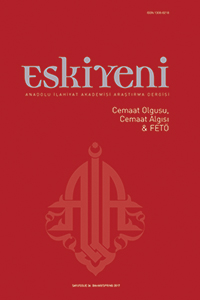Türkiye’deki İslâmî Fırkalaşma ve Cemaat Olgusunun
Felsefî Tahlili
A Philosophical Analysis on Islamic Sectarianism and Religious Community Phenomenon in Turkey
Author(s): Muhammet ÖzdemirSubject(s): Philosophy, Social Sciences, Theology and Religion, Islam studies, Politics and religion
Published by: Anadolu İlahiyat Akademisi
Keywords: Turkey; philosophy; Islam; sect; religious community; the native informant; sociology of religion;
Summary/Abstract: This study examines the religious sects and the case of religious community which have developed in Turkey in the context of philosophy. This analysis requires to be identified the concepts of “sect” (al-firka) and “religious community” (al-camâa) separately in terms of classical history of Islam and modern sociology and contemporary Turkish society. Therefore, the philosophies of Ludwig Wittgenstein and Michel Foucault and Gayatri Chakravorty Spivak’s post-colonial analysis are applied to the experience of modern Turkey. The main argument of the study is the absence of real base of religious discussion and that religious community has derived from social necessities in Turkey. The religious discussions should not be confused with the presence of some new understandings which have derived from being of religious communities. In comparison with that the case of sectarianism is deceptious, new religious understandings which have derived from the case of religious community are social developments. Both can be understood in the context of the colonial experience and the concept of globalization. So, the article is interested with the archaeology of social reality and its moving to the science.
Journal: Eskiyeni
- Issue Year: 2017
- Issue No: 34
- Page Range: 25-44
- Page Count: 20
- Language: Turkish

